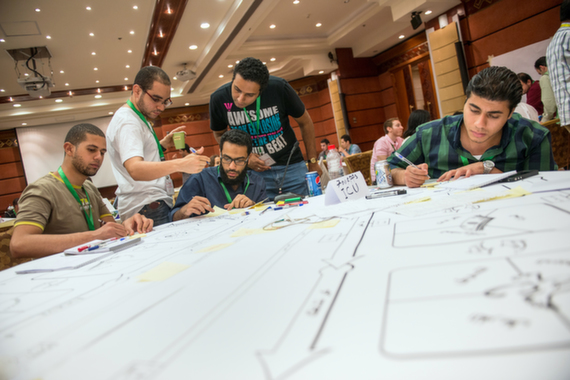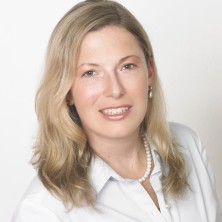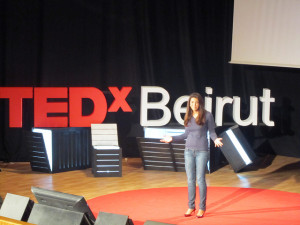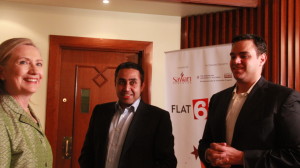
As AUC’s downtown Cairo campus bore witness last month, Egypt’s entrepreneurial spirit is measured in the droves. The RiseUp Egypt Summit held there over two days was a veritable celebration of the country’s eager entrepreneurs. Even Talaat Harb, the godfather of Egyptian entrepreneurship, made an eleventh hour appearance in hologram form.
While the atmosphere was high-spirited, those who flocked to RiseUp went with the earnest goal to drive the startup scene forward. Over the last couple of years, we’ve seen the rise of what industry types like to call an “ecosystem” – a network of entrepreneurs, investors, NGOs, startup accelerators and mentors – and now a physical manifestation in the GrEEK Campus tech park.
With an abundance of new ideas – whose originators come mostly from a restive, educated, underemployed generation of tech savvy youth – Egypt’s startup scene packs more than promise. So what’s missing? We asked a few of the top investors in the region for their opinions.

Con O’Donnell, Serial Entrepreneur and Angel Investor
Investors will generally only invest for higher returns, so that means that the business has to be scalable and not all the businesses are scalable… they won’t go to a regional and they won’t go to a global.
So some investors, especially if you’re talking to VC investors, they’re gonna invest five or 10 million dollars into something, then… it’s gotta be like a 200 million dollar business at the end of the day, right? So it’s gotta be able to grow that big. Not that many businesses have scaled that big here, so there’s a lack of experience in how to scale a business, how to structure a business right.
We’re still at the stage, I think, where it’s mainly techies driving it and they lack other commercial skills – marketing, sales and stuff, or industry-specific relevance. So they might be coming up with a health application but they don’t know anything really about the health care system or health itself, you know, or medicine, pharmaceuticals. Their lack of specific knowledge is not gonna help them to solve the problem.
And unwillingness, necessarily, to partner with someone who does know that to make the full – the match. It’s got great technology and it’s the idea and the vision, [but it] needs someone who understands the landscape…
So we often find that it’s a whole bunch of techies trying to solve a problem that’s not for – not a technical problem, it’s a social problem, it’s a habit problem…
The money’s not like a big pot that you should just be able to dip in and dip out… Really, the money’s only justifiably given to people who have all of the qualities that I mentioned, plus the ability to scale it. Those are the ones who really deserve the money.
Everyone else should be pivoting, changing, starting again, partnering with people. There’s no – there’s very very very very very very very very few of these entrepreneurs who consider working with others to make something bigger.
There’s a lot of, ‘Why don’t we talk to these guys? They’re working in similar spaces. Noo, he’s gonna take my idea or – where’s the power dynamics?’ Part of it is ego. Part of it is inexperience.
 Heather Henyon, Founder of Balthazar Capital and Angel Investor
Heather Henyon, Founder of Balthazar Capital and Angel Investor
I think there still needs to be more connection with the other countries in the region, so specifically Lebanon, Jordan, Dubai [UAE], and I think Egypt is still a bit isolated, so if there are ways to integrate some of these other countries, it might help the entrepreneurs here. And likewise, you know, I think it’s a huge market in Egypt, so to encourage more investors, other companies to access Egypt instead of Saudi might make sense.
 Hala Fadel, Chair of the MIT Enterprise Forum Pan-Arab Region, Fund Manager and Angel Investor
Hala Fadel, Chair of the MIT Enterprise Forum Pan-Arab Region, Fund Manager and Angel Investor
The experience. Most of them are first-time entrepreneurs and maybe the political stability and the framework.

Hany Sonbaty, Co-founder of Sawari Ventures and Flat6Labs and Venture Capitalist
What do you mean by experience? I don’t know what that means… Oh, you mean practical experience. Well that’s why we have Flat6Labs…
The only way to learn it… you know, I once read a book about swimming. Honestly! I got the book and read it and, you know, I did all the arm movements, but there’s absolutely no way you can swim unless you get into the water. And there’s absolutely no way that you know what it is to start a company until starting it – or at least work in a corporate environment, know what it takes. The only real experience that matters is doing it…
This gentleman here… he just started his company with his friend… And he can tell you about experiences. There are lots of things he learned by observing other companies as part of the process, but I’m sure a lot of the experiences he got over the last year is by actually confronting – how to talk to a customer, when to trust a customer, when to walk out of the meeting, when to know that this guy is wasting your time, how to plan ahead, how to hire, how to fire.
You can talk about these things – I mean, for example… there’s probably somebody in his company who he wants to fire but didn’t have the guts because he didn’t want to rock the boat. You know, how can you teach that? You can’t.
So experience – that’s why we think the accelerator is very important. It gives them real life experiences in a short, concise manner in a way that we control the capital investment if there’s not a lot of money up front. And then if they prove that they can do something, you know, more money flows into them from other people…
The money’s nowhere near there… I said today in the morning, in terms of the opportunity at hand, the amount of available capital to invest in risk-related, risk ventures, is nowhere near enough…
It takes decades to build the venture capital asset class. It’s not something you build overnight. And I’ll give you a normal example: If you look at the banking industry here, or the number of people with credit cards, it’s not as advanced as it is in America. The number of bank accounts per capita in America is much higher than anywhere else because they’ve had banks for longer and more stable, you know, it’s just the natural progression.
More and more, our tasks as venture capitalists, is to attract more capital into the space, showing that it can be a profitable, a very profitable investment for them – that is our job. More importantly, it is our job to create our second generation of venture capitalists so we can expand the talent pool that can manage risk capital…
When we were doing our accelerator… it was the first accelerator in Egypt, so there was nobody who had done this job before. So we had to get someone who had the skill sets, train them, and do all sorts of things. Now we want ten, twenty people, in the next couple of years who can do this job so we can have ten, twenty accelerators when the capital is available. And so on, so forth.
So we are on a mission to attract more capital into the business and to also deepen the talent pool who work in our business. That’s our mission.
WE SAID THIS: Check out Q&A: Is Egypt’s Startup Scene Just a Bubble? Top Investors Answer.


